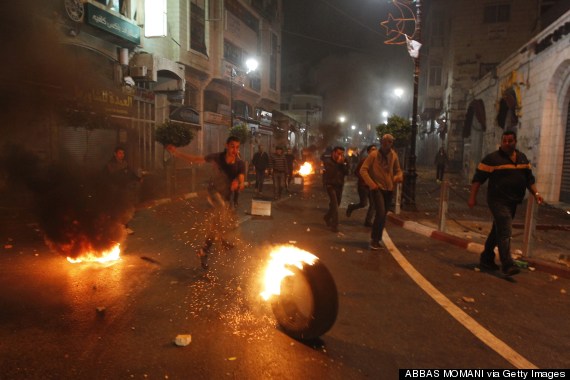This article first appeared at Worldcrunch. The original-language version was published by Le Monde.
This article also currently appears at WorldCrunch.com

JERUSALEM -- It is possible that, without us really noticing, the Third Intifada has already begun?
The killing of a young Palestinian, on July 2, was an apparent act of vengeance that came after the discovery of the bodies of the three young Israelis abducted on June 12. "An eye for an eye." This Old Testament principle has always been popular in the Holy Land. But observing that the Jewish and Palestinian peoples are the heirs of a sum of wrongs and spilt blood is not enough to remove all responsibility from their political and religious leaders.
Without claiming responsibility for it, Khaled Mashal, the political leader of Hamas, the Islamist movement in power in Gaza, congratulated the people who had abducted the three students of a Talmudic school in the West Bank. In response, extremist rabbis such as Yitzhak Ginsburg and Yitzhak Shapira issued diatribes of hatred on social networks.
If such confirmation was needed, we now have it: Jewish terrorism exists alongside Palestinian terrorism.
This situation is all the more worrying since this escalation in sectarian violence comes as the reflection of a sharp rise of military tensions between Israel and Islamist movements in Gaza. Israel has concentrated its troops in the south, and the hawks in Prime Minister Benjamin Netanyahu's government are calling for a large scale intervention to topple "Hamastan" once and for all.
But reason can still prevail. It is neither in Israel's nor in Hamas' interest to start a new war. The latter now has the means to strike Tel Aviv, and Netanyahu would struggle to survive politically if the heart of the Jewish state were badly hit. As for Hamas, it is already in dire straits. Gaza has been subjected to an Israeli blockade for seven years, and Abdel Fattah al-Sisi's Egypt tightened the grip further by destroying the hundreds of smuggling tunnels that were the economical lifeline for the 1.7 million Gazans.
Netanyahu's favorHamas seemed to have learned its lesson: The only way out of its isolation was to reconcile with Fatah, the party of Palestinian President Mahmoud Abbas, a move which would grant it access to an unprecedented legitimacy. But with the murder of the three Israelis, the whole logic behind this political aggiornamento collapsed, and Hamas finds itself once again subjected to public scorn, with the reconciliation strategy in tatters.
Seen from that angle, the triple abduction, beyond the human tragedy, has been a political windfall for Netanyahu. By accusing Hamas, he managed to turn an intelligence fiasco into a diplomatic and political victory. Its positive consequences were evident for an Israeli government that tries its best to delegitimize and divide the Palestinian movement.
Diplomatically isolated since the international community supported the principle of a national unity Palestinian government, Netanyahu, who instead saw it as a move that would strengthen terrorism, regained the upper hand.

He took advantage of the situation by launching a vast crackdown on the West Bank. The question now is whether this political offensive will be followed by an all-out military intervention and ground war. Israel wants to reestablish the deterrence power of the Israeli Defense Forces (IDF) against Gaza, but its main goal is political. It is to undermine the grounds of the Palestinian reconciliation by insisting that one of its members, Hamas, remains a terrorist organization.
Summoned to distance himself from an act described as despicable, Mahmoud Abbas made the Palestinian security forces join the hunt for the abductors of the three Israelis, thus turning the Palestinian authority into the Israeli army's security subcontractor in the West Bank, a move that left many victims, both human and political.
The last round of negotiations between Israelis and Palestinians ended amid general indifference, as if the previous nine months of talks, focused on the peace "process," but never on what is essential, had never taken place. In this context, it will be a long time before anybody tries to revive the negotiations again.
Two scenarios seem on offer for Israel and Palestine. The first one is the status quo, in other words, political deadlock, which can only reassure an Israeli Prime Minister with no historical vision for his country. The IDF will continue its role of an occupation army in the West Bank to maintain what is de facto apartheid. The other scenario, that of a Third Intifada, might be written by the generation of young Palestinians who grew up after the 1993 Oslo Accords.
That generation was young at the time of the Second Intifada. It is now reaching maturity with no other future in sight than a dead end: no Palestinian state and a daily life similar to their parents', made of humiliations, random arrests and violence. There is a possibility that this new sacrificed generation will find its role models in the radical circles of the Islamic State.
